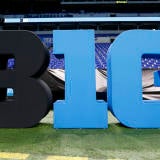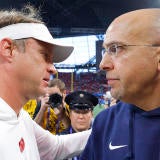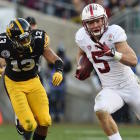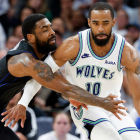Stanford running back Christian McCaffrey poses a fascinating question: What more can a guy do when he does everything already?
You'd think breaking the NCAA single-season record for all-purpose yards, previously set by one of the greatest football players of all-time, would have been enough to win the 2015 Heisman Trophy.
Instead, college football's highest individual honor went to Alabama's Derrick Henry, a production back of another kind. But while Henry was bulldozing his way nearly 400 times to a national championship, McCaffrey was earning a reputation as college football's most versatile weapon.
Following a Rose Bowl victory over Iowa in which he scored on the first play from scrimmage, McCaffrey was credited with 3,864 all-purpose yards, surpassing the previous record of 3,250 yards by Barry Sanders. That broke down into 2,019 yards rushing, 1,070 kick return yards, 645 yards receiving and 130 punt return yards.
"People were watching the Rose Bowl and asking if the ballots could be re-cast for the Heisman," said Zac Ellis, a former Heisman guru at Sports Illustrated who now works as the digital media editor for Vanderbilt athletics. "And West Coast people were saying, 'Where have you been? He's been doing this all year.'"
Saying? More like yelling obnoxiously.
Still, the point was taken. McCaffrey was shredding defenses week after week, and yet, it never felt as though the Heisman was his to lose. Why? Ellis has a couple of theories.
"Time zone bias is a real thing," he said. "Reading about what McCaffrey did the next day doesn't create the same hype as watching him in person."
To that point, six of Stanford's regular-season games kicked off after 10 p.m. ET. Usually, those games extend until about 2 a.m. There were three prime-time games at season's end in which McCaffrey was featured: vs. Oregon (38-36 loss), vs. Notre Dame (38-36 win) and the Pac-12 title game vs. USC (41-22 win).
Against the Ducks, McCaffrey had a touchdown and 244 all-purpose yards -- 32 yards below his season average per game but certainly nothing to dismiss. Still, it was a loss that eventually knocked Stanford out of the College Football Playoff race. Two weeks later, McCaffrey tallied 228 yards against Notre Dame, but he was held to under 100 yards rushing, 19 yards receiving and zero touchdowns. By the Pac-12 championship, it was decided that the Heisman was Henry's barring a poor performance in the SEC Championship Game. Henry didn't disappoint with 189 rushing yards and a score.
"You have to get noticed at the right time and in the right games," Ellis said. "People need to see it."
Now is a good time to pause and note the exceptions to the time zone bias. The most recent example is 2014 winner Marcus Mariota from Oregon. Reggie Bush, Matt Leinart and Carson Palmer from USC's dynasty in the 2000s say hello, too.
But three of those four have something in common that McCaffrey doesn't -- not yet, anyway. They all played for national championships. Stanford hasn't quite reached that level.
That led to Ellis' second and more pertinent point: Winning matters but not as much as winning more.
"Stanford was a good team last year, but it was already decided the Cardinal weren't going to the playoff," Ellis explained. "Alabama's season was going to be extended. That's probably unfair from a voting standpoint, but that's the way it is."
And if given the choice between a running back from Alabama and a running back from Stanford, Heisman voters have shown us in recent history who is going to win out ... twice. In 2009, Alabama running back Mark Ingram edged out Stanford running back Toby Gerhart.
Stanford's most recent Heisman curse extended to the quarterback position, too. In 2010 and 2011, Andrew Luck finished second to Cam Newton and Robert Griffin III from Auburn and Baylor, respectively.
What does McCaffrey need to do differently to break Stanford's second-place Heisman hex? The answer isn't so simple. Many of the factors that affected his placing a year ago -- kickoff times, program brand and team record -- are uncontrollable. Short of playing quarterback and defense, there's not much more McCaffrey can do.
"It's a similar situation for [Clemson quarterback] Deshaun Watson," Ellis said. "It's hard to tell either of them what to do better because they've done it all."
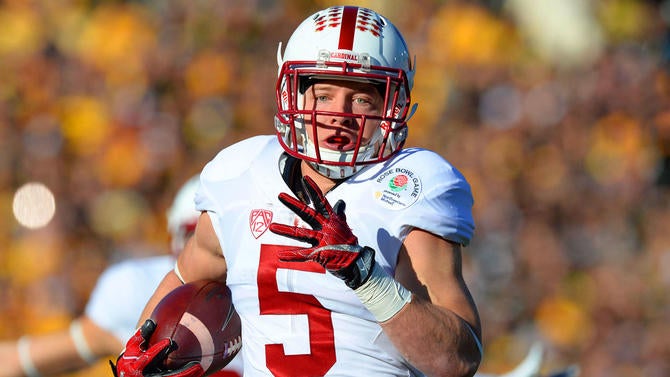
However, McCaffrey does enter the 2016 season with something he didn't have this time last year: national name recognition. With Stanford breaking in a new quarterback -- Ryan Burns was named the starter for Week 1 -- the offense could rely even more on McCaffrey's versatility. Per Ellis, that could either help pad his stats or wear him down too soon. With crucial games at Notre Dame (Oct. 15) and Oregon (Nov. 12) in the second half of the season, McCaffrey needs to be his best at the right time.
Another thing McCaffrey has going for him is versatility. "He's a Swiss Army man," Ellis said. Production can sometimes overshadow pure talent in the Heisman race, and while no one should doubt McCaffrey's raw skill, the yardage he can accumulate through different mediums can compensate for something:
McCaffrey is not considered the best pure running back in college football. And that's a deep talent pool, too.
LSU's Leonard Fournette and Florida State's Dalvin Cook are both rated higher than McCaffrey by CBS Sports for the 2017 NFL Draft heading into the season. McCaffrey isn't the No. 1 running back for ESPN's Todd McShay either. These are just opinions, and they can and will change, but they paint a picture about the running back landscape in college football.
If McCaffrey isn't thought to be the best running back, he's not going to be the best receiver, either. Therein lies the irony. It's entirely possible McCaffrey wins an award for being the "most outstanding player" in college football without actually being the most outstanding player at any one position.
When you put all of those positions together, though, no player is more valuable. The only thing left find out is whether that's enough.










